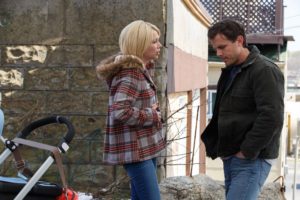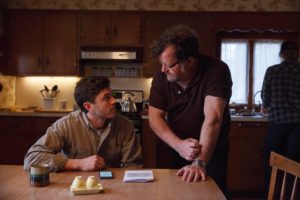
Photo credit: Claire Folger, Courtesy of Amazon Studios and Roadside Attractions
Composer Lesley Barber was tasked with setting the tone for the heartbreaking family drama, Manchester by the Sea. The story follows Lee Chandler (Casey Affleck), who must face the ghosts of his past when he returns home to take care of his teenage nephew Patrick (Lucas Hedges) after his brother’s death.
Having worked on his award-winning film, You Can Count on Me, Barber had an established relationship with writer/director Kenneth Lonergan. After production, she received the script and began sending musical ideas to be used in the edit based upon the read. Later they went through the film in the editing room. Once there was a fine cut, they got more specific and Barber began thinking about orchestrating sections and filling out the score.
“If I can come into the process early on, that is a real luxury and the best way of working. I got an intuitive feel for the material and Lee’s journey. I wrote a piano piece. We hear my original recording over Lee looking for a job later in the film,” shared Barber. “I also recorded the a cappella piece that we hear first when Lee is driving, and second while Patrick is going to the funeral. Those pieces had a connection with the script.”
According to Barber the director has a deep knowledge of music and uses borrowed pieces of music as part of his film style. In this film, he felt classical music by Handel worked. It was Barber’s job, to make a coherent score that included the source music.
“As a composer, you need to find music that not only connects with the storytelling, but I also had to think about how I could write music that unifies, supports, frames and blends with the classical pieces in the film,” explained Barber. “If there are beautiful pieces like that, as a composer you have to make them part of your vision instead of skipping those parts in your mind.”

Photo credit: Claire Folger, Courtesy of Amazon Studios and Roadside Attractions
Instrumentation is “extremely intuitive” for Barber. When she starts composing, she puts together a special sound for each score. It works best when she follows her first instincts. The landscape as well as the characters informed the music and even impacted how the score was recorded.
With the first shot of the little boy and the ocean, Barber wanted the score to have the atmosphere from a very large space. The strings and vocals were recorded separately in a large concert hall to get a real sense of scale. Other more intimate cues were recorded in a chamber setting. The a cappella pieces were inspired by early hymn-like music from the Puritans and 17th century life in that part of the world.
For Barber, the challenge in all of Lonergan’s films is to have “honesty” in the music. This score tends to go to places that the music inside Lee goes, and goes slightly beyond Lee,” revealed Barber. “With Kenny’s filmmaking, if the cues don’t feel like they have an authentic connection with the film, I have to go an revisit them until they do. You don’t have something until you have something.”





